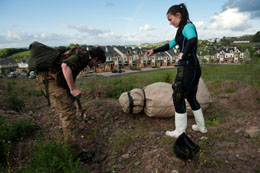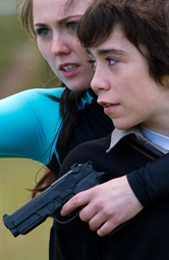As if in direct response to drama critic Fintan O'Toole's recent assertion that contemporary playwrights are no longer writing the “big, important plays” that interrogate Irish society, upstart company Hammergrin has set its latest work in that most representative feature of the disintegration of the country's sense of itself: the ghost estate.
Latch, as with Hammergrin's previous work – Hollander (2009) and K: the Iowa Project (2008) – interweaves a linear narrative with elements of the surreal, creating a production that is by turns hilarious, surprising, thought-provoking, confusing and inscrutable, but whose basic premise appears to be to probe the landscape of a suburban housing estate by examining it through the eyes of a lonely schoolboy.
Hammergrin has form here: the company has long made the choice of working a story around a location. In Hollander, which told the tale of a house placed on hold, Miss Havisham-like, as a result of an event from the past, the company played games with the possibilities of the location: characters entered rooms from behind fireplaces, another room was turned entirely upside down. In K: the Iowa Project, Hammergrin explored the capacity of a large, unused warehouse to operate as a backdrop to a production that considered feelings of distrust and paranoia.
So how does the company work with the familiar, desolate landscape that is an Irish housing estate, and what, if anything, can such a piece of work say about today's society? For a start, the production makes deliberate and inventive use of the location: having obtained the developer's permission to take  over a series of unfinished houses on the estate, the small audience (only 18 per night) is then placed, two to a house, inside these houses. We become the 'watchers', looking out on the action taking place on the green space opposite, but unwilling or unable to intervene on anyone's behalf.
over a series of unfinished houses on the estate, the small audience (only 18 per night) is then placed, two to a house, inside these houses. We become the 'watchers', looking out on the action taking place on the green space opposite, but unwilling or unable to intervene on anyone's behalf.
On that green space, we are introduced to a series of characters: bored teenagers Cassie (Róisín O'Neill) and Payne (Charlie Kelly), passer-by Pete (Raymond Scannell), indebted businessman Donnelly (Ciarán Bermingham) and, of course, schoolboy Latch (Doug Queally), who appears to be almost always alone (his parents leave him to his own devices) and who is viewed askance by others on the estate, particularly the teenage duo, who tease and aggravate him. “He's doing that counselling thing again,” they say, later remarking that “he leaves skidmarks on the sheets.”
It appears at this point as if the narrative is pointing towards some sort of interrogation of soulless, suburban living: Cassie and Payne have nothing to do and nowhere to go – at one point, they amuse each other by seeing how quickly they can jump over the front patches of their neighbours' gardens – while Latch, neglected by his parents, ignored by his community and victimised by his peers, must turn to his imagination for solace and support.
It is here that the play shifts direction and veers into the surreal, undefined territory that has become Hammergrin's hallmark. Latch, witnessing what appears to be the heart attack of a neighbour, calls on some friends – but some very special kind of friends – to help him deal with the situation. As darkness falls (the play begins at 9.30pm) and events spiral out of control, we, the watchers, become more aware of our role. Latch is abandoned by the only friends he has; we watch it happening, and do nothing to stop it.
 But what does it all add up to? Leaving aside the occasional technical problems, which obstruct our hearing of the show, and the difficulty (notwithstanding the binoculars provided) of actually seeing everything that takes place – although it is clear, nonetheless, that the performances are uniformly strong – it is hard to come away with a precise understanding of what Hammergrin is trying to say. Is the play about the watchers and the way in which the recent construction of our communities has encouraged minimal communication among neighbours? Is it about the bleakness of life in dystopic, post-boom Ireland? Is it about a young company having fun with a site-specific location?
But what does it all add up to? Leaving aside the occasional technical problems, which obstruct our hearing of the show, and the difficulty (notwithstanding the binoculars provided) of actually seeing everything that takes place – although it is clear, nonetheless, that the performances are uniformly strong – it is hard to come away with a precise understanding of what Hammergrin is trying to say. Is the play about the watchers and the way in which the recent construction of our communities has encouraged minimal communication among neighbours? Is it about the bleakness of life in dystopic, post-boom Ireland? Is it about a young company having fun with a site-specific location?
Ultimately, what we are left with is rather a mixed bag: an often funny, at times spunky production that has the guts to turn its gaze on certain issues, but then appears to forget what those issues might be, or at the very least, gets lost in the attempt to identify them. None of this means that the work has been for naught, because Hammergrin’s theatre is unfailingly original, inventive, engaging and different, and, particularly in the quieter moments of the show’s beginning, the writing plays jubilantly on the possibilities of the Cork accent and turn of phrase – but it does mean that the company, in not working out fully what it is trying to say, has left its audience, like the housing estate of the play's location, wandering around in no-man's land, with nowhere particular to go.
Rachel Andrews is an arts journalist and critic based in Cork.